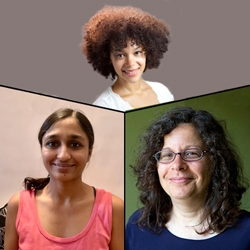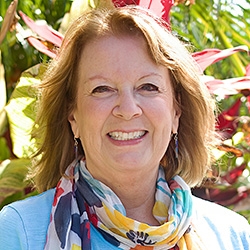

Search Results: power
-
Join CNVC Certified Trainer Arnina Kashtan as explores interdependence, autonomy, valuing self and others, and power-sharing in your relationships. Free yourself to honor your longing for community, belonging, and love.
-
The human needs that we all share are the foundation of the Nonviolent Communication (NVC) process because it is in connecting to needs that we find inner freedom, empowerment and compassion.
-
Roxy Manning's 2023, 4 session course, will help you
- Explore several essential components of facilitation using a caring for all, power-with lens
- Know how to identify and gather together the people who need to be in the room
- Learn tips and strategies for ensuring all voices are heard
- Grow your capacity to name and address power dynamics and unconscious bias that impacts group members’ experience
-
Listen to Roxy Manning explore the barriers to speaking authentically as powerful voices for change, and practice these needed conversations about the ongoing violence in the streets of America.
-
What are the most powerful things I can do to build an inspired relationship? I answered the question with romantic relationships in mind; however, I believe the answer below applies to all important relationships.
-
This chart helps translate words that imply blame into true feelings and unmet needs.
-
Miki Kashtan shares how to build trust, balance power, and welcome honest “no’s” in dialogue.
-
This anecdote illustrates how a young man had the social awareness to consider how male conditioning may bring up competitiveness in his interactions with another man. The young man offered transparency and checked for consent in a way that shows an embodiment of power-with, togetherness, consideration, care, collaboration... and all without displaying any formal NVC training, and without looking to impress.
-
When we have few external resources (money, time, health connections, etc), we can still empower ourselves and one another. We can strengthen our internal resources, inspire people to join our cause, build solidarity, and influence others who have external resources to support us and our causes.
-
Itzel Hayward and Kathy Simon's course is designed to help you step into your power and create a more just world while staying aligned with compassion and empathy.
Using practices and insights based in Nonviolent Communication, this five-session series explores how to challenge racist words and ideas in ways that are most likely to encourage others to openly reflect on their beliefs and behavior. This is an important step in making real change.
You will come away with an increased ability to:
- Stay grounded in conversations that can be painful and upsetting
- Respond meaningfully to perspectives that are different from your own
- Find words to express clearly and passionately why it matters to transform social systems
-
- Explore the complexities of how we can care for all of life using NVC
- See the role that power plays in relation to observations, feelings, needs, and requests
- Learn how to support people from many backgrounds in being able to apply NVC
- Discern how to engage with these vast topics as we learn and share NVC
-
Whether we have more or less power and privilege, anything without liberation for all is within patriarchal separation, and will continue cycles of oppression. To liberate ourselves and one another we need to increase our collective capacity through developing related knowledge, skills, research; build an understanding of patriarchal roots; confront lovingly; co-hold dilemmas about privilege; co-shape outcomes; etc.
-
- Learn how every decision we make perpetuates the status quo or brings us closer to the vision of a world that works for all
- Find out about our big brain capacity to integrate needs, impacts, and resources to make decisions that work for everyone
- Understand why power differences interfere with collaborative decisions and what can be done about it
- Discover tools that support collaboration in larger groups and organizations— even across power differences!
-
Why does NVC practice, and NVC training/coaching, appear to be not enough to bridge divides between people? This article takes a look at the trickle down effect of our societal conditioning, what we can add to our NVC lense, and what we can do "upstream" when NVC doesn't seem to be enough. Additionally, the article talks about unseen constraints that men, women and minority groups face in organizational settings...
-
Giving feedback across a differences in culture, race, and power isn't something that we have to do -- but we can choose to do it for our own liberation, if we want. And if we choose that path, impact delivered well can invite caring for all needs and increase capacity to learn. This is the exacting, rigorous work of speaking about impact without attributing anything to the person whose actions resulted in the impact. Read on for part 1 of 2.
-
Along with it’s potential for helping others calm their emotions and feel deeply understood, the Nonviolent Communication process of empathetic listening can help someone increase their capacity for finding their own truth.
-
- 3 full-length courses to deepen your empathy practice
- Learn your body’s “language” and how to listen deeply to it
- Quickly reconnect and return to empathic presence when you are triggered
- Enhance your listening skills and experience greater ease and joy in all your interactions
-
Finding your power in seemingly powerless situations doesn't mean denying what happened, your feelings, your needs, nor the behavior of others that didn't meet needs. It does mean reexamining those situations with the intention to compassionately look for your contribution and for clues to your hidden perceptual biases. Read on to learn about about finding these clues, and more.
-
How do you know when you’re projecting disowned parts or replaying old relationship dynamics? It’s hard to know for sure, but if you find yourself upset or shutting down and unable to have a dialogue in which you can speak clearly about your feelings and needs and empathize with the other’s feelings and needs, there is likely a projection. The stronger your reaction, the more likely you are projecting.
-
Trainer Tip: Autonomy is not a need, but rather a way of living. We always have choices in life, even if none of them appeal to us. Becoming aware of our choices and taking responsibility for them leads to greater joy and empowerment.

Quick Links
Subscription Preferences
Stay In Touch!
Looking for ways to keep up with NVC Academy news, get special offers, free resources, or words of inspiration? Here are five ways to stay engaged:



















